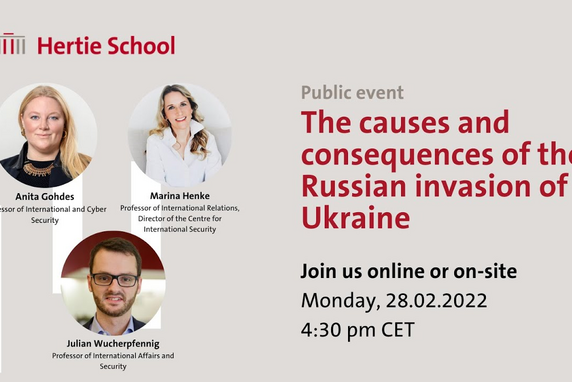Anita Gohdes, Marina Henke and Julian Wucherpfennig analyse the prospects for peace or further escalation.
Reasons for the Russian invasion of Ukraine and its potential consequences were the topic of a panel discussion at the Hertie School on 28 February 2022. Hertie School faculty members Anita Gohdes, Professor of International and Cyber Security; Marina Henke, Professor of International Relations and Director of the Centre for International Security; and Julian Wucherpfennig, Professor of International Affairs and Security, took part in a wide-ranging conversation moderated by Acting President Mark Hallerberg.
Topics included the chances for successful peace talks, the usefulness of sanctions, the effects of cyber warfare and the threat of a nuclear escalation.
Marina Henke opened the conversation with an analysis of the geostrategic aspects of the conflict, noting that the implications go well beyond the conflict lines between Russia and Ukraine. “This is not just a battle about Ukraine, but a battle that looks at the future of the liberal world order based on the rule of law, based on democracy, which is under attack,” said Henke.
Julian Wucherpfennig said he did not expect the war to end quickly, noting the minimal bargaining space for peace talks at the moment. Anita Gohdes spoke about the use of cyber-attacks, saying that Russia has essentially been in a cyber war with Ukraine for the last eight years since the conflict began.
Find a recording in English of the event here.
More about our experts
-
Marina Henke, Professor of International Relations | Director, Centre for International Security
-
Julian Wucherpfennig, Professor of International Affairs and Security
-
Anita Gohdes, Professor of International and Cyber Security


